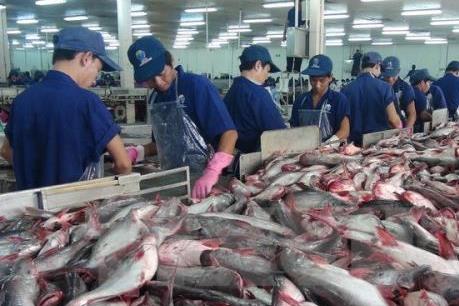Viet Nam’s export of tra fish is forecast to reach US$2.06 billion this year, decreasing by 9 per cent year-on-year, according to the Vietnam Association of Seafood Exporters and Producers (VASEP).

Viet Nam’s export of tra fish is forecast to reach US$2.06 billion this year, decreasing by 9 per cent year-on-year, according to the Vietnam Association of Seafood Exporters and Producers (VASEP).
The estimation was given after exports in the fourth quarter of this year fell by at least 10 per cent to reach $600 million.
Tran Dinh Luan, director general of the General Department of Fisheries, said the export of tra fish fell because the imports from some major markets including the US and China declined from March this year, which stemmed from their demand for goods storage at the end of 2018 for fears of rising prices.
In addition, production developed as the price of raw tra fish has remained at a high level in two years of 2017-18, creating a downward trend due to oversupply.
A number of countries, such as China, Indonesia and Bangladesh have started investing in tra breeding. Indonesia has developed tra breeding areas with an expectation to occupy the Middle East market. Meanwhile, China tightened inspection of goods quality, including tra fish, exported across the border from June this year – with many Vietnamese tra exporters yet to respond to new regulations.
China is currently Viet Nam’s largest tra importer, with January-September import of Vietnamese tra fish worth $450.7 million, up 19.6 per cent year-on-year. Viet Nam previously exported whole pangasius to some border provinces in southern China, but tra fillet products are now available in major cities such as Beijing, Shanghai and Dalian.
According to General Secretary of VASEP Truong Dinh Hoe, Viet Nam continues facing difficulties in exporting tra fish to US and EU.
“In the US market, exports are not forecast to recover until the end of the first quarter of next year when the Department of Commerce will give the final result on anti-dumping tax on Viet Nam’s tra fish,” Hoe said.
“Meanwhile, the export of seafood to the EU is struggling with the yellow card after fishermen were found to have violated regulations on illegal, unreported and unregulated fishing (IUU) fishing,” Hoe added.
The Vietnam-EU Free Trade Agreement will take effect from 2020, in which tariffs on tra products will be gradually reduced to zero per cent under a three-year roadmap. This means that Viet Nam’s export of tra fish will enjoy zero per cent from 2023, from the current basic tax rate of 5.5 per cent (frozen tra fillet). — VNS





